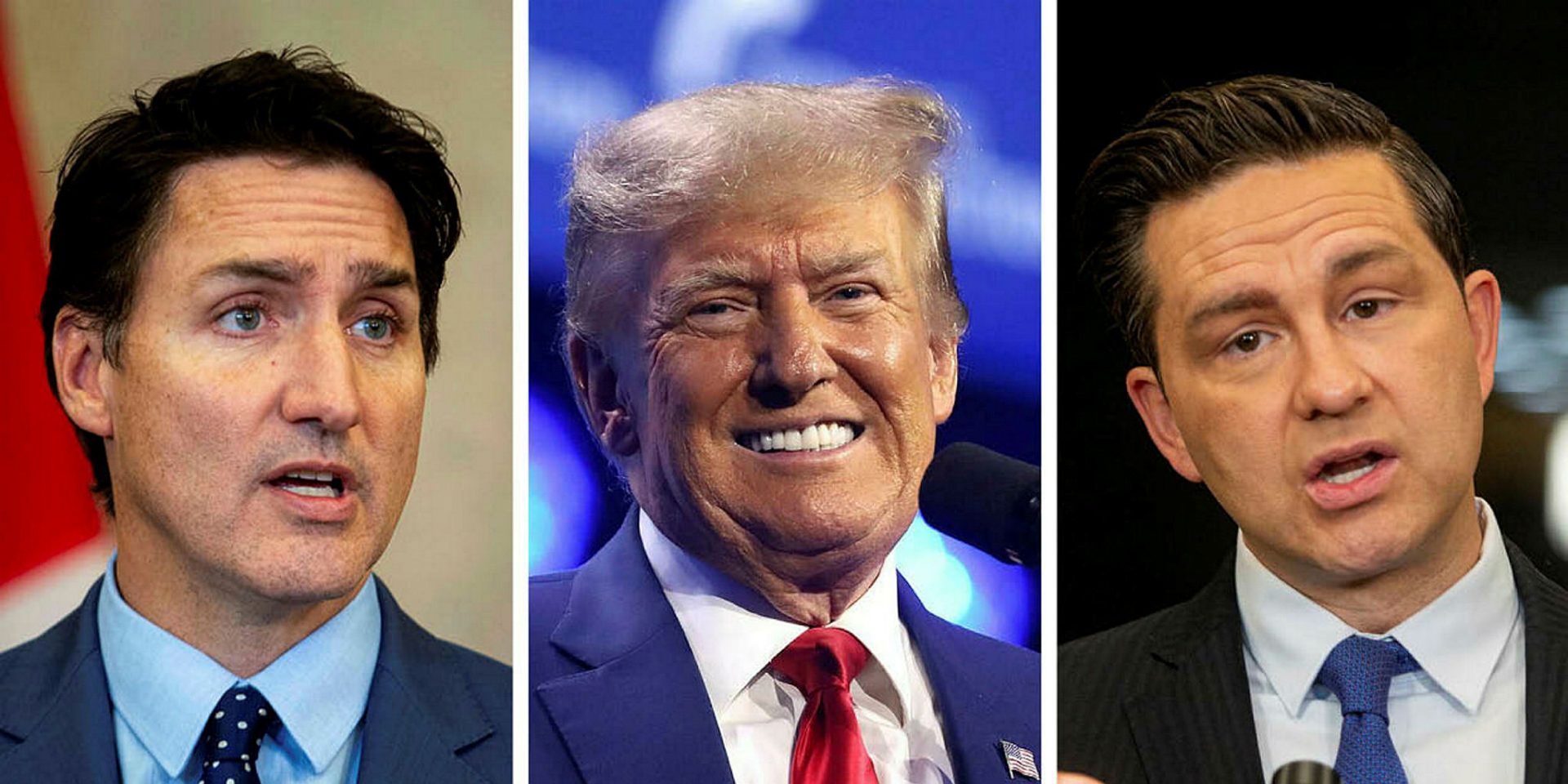Change in the United States and the prospect of tariffs imposed by Canada's largest trading partner have done little to shift the voting intentions in this country, according to some pollsters.
“The year’s looking like it's going to end very much like it started with the Conservatives,” said David Coletto, CEO and chair of Abacus Data. “In our most recent survey, they’re leading by over 20 points, leading in every region except in Quebec, leading across every demographic group–young people, older Canadians, men and women.”
The polling narrative throughout 2024 has been one of the Conservatives holding a double-digit national lead. A Dec. 3 Nanos weekly tracking survey showed the party had the support of 42 per cent of respondents, compared to 23.4 per cent for the Liberals, 20.6 per cent for the NDP, 6.8 per cent for the Bloc Québécois, 4.1 per cent for the Green Party, and 2.3 per cent for the People’s Party.
In comparison, a Nanos survey published on Jan. 9 showed the Conservatives enjoyed 38.3 per cent support at that time, the Liberals 26.4 per cent, the NDP 20.5 per cent, the Bloc 7.4 per cent, the Green Party 4.2 per cent, and the People’s Party 2.1 per cent.
As for the leaders of the parties, an Abacus Data poll published on Nov. 20 showed Conservative Leader Pierre Poilievre holds a net impression score of plus-three, NDP Leader Jagmeet Singh (Burnaby South, B.C.) has a net favourability of minus-seven, and Prime Minister Justin Trudeau (Papineau, Que.) has a net score of minus-38.
The figures for Poilievre and Trudeau were relatively similar to those in an Abacus survey from Jan. 11–plus-six for the Conservative leader, and minus-34 for the prime minister, in what was noted at the time was “the worst we’ve ever measured.”
Coletto said the Conservatives’ lead started to increase in mid-2023, after an interest rate rise and shortly before Trudeau shuffled his cabinet. Other events in the life of the Trudeau government that shifted the needle included the SNC-Lavalin scandal that ended the Liberals’ prolonged honeymoon, and the onset of the pandemic that altered political alignments at a provincial and federal level.
“From an aggregate public opinion perspective, something has to happen that causes millions of people to say, ‘Well, now I have a different view of the world and of the political choices that I have available to me,’” he said. “And so I don't think we should expect public opinion to shift all that much from week to week, even month to month.”
Darrell Bricker, CEO of Ipsos Public Affairs, said that even major events may be less likely to improve the situation for the Liberals.
“What's happened is it's no longer the message, it's really the messenger, and people really want change,” he said. “Seventy-five per cent of people that we poll on surveys say they want a new party in charge, so everything that's coming out of Ottawa these days is basically discounted—good, bad or indifferent.”
“It's really difficult for a government when the public just stops listening, and that's basically what's happened.”
Prior to the victory of U.S. president-elect Donald Trump last month, there had been questions as to whether the Republicans’ return to the White House could have an impact on Trudeau and the Liberals’ fortunes.
In the aftermath of the U.S. election last month, the prime minister and his ministers have sought to contrast Trudeau’s previous experience dealing with Trump’s first four years in office with the Conservatives.
“Do we trust the guy who renegotiated NAFTA with Mr. Trump, the guy who secured the border during the pandemic of the century and the guy who went down to president-elect Trump's playing field to fight for Canadians to secure the border, or do we trust the guy who spent 20 years making up interesting rhymes and spent 20 years securing one and only one thing, his own paycheque and a bloated pension?” Immigration Minister Marc Miller (Ville-Marie-Le Sud-Ouest-Île-des-Soeurs, Que.) said during Question Period on Dec. 4.
So far, however, Trump’s forthcoming return to the White House has done little to change voting intentions among Canadians.
An Abacus poll late last month also suggested that Canadians believed Poilievre could deliver better outcomes for this country when dealing with Trump, with 45 per cent compared to 20 per cent for Trudeau. Respondents were more split on the approach to take against Trump. Some 42 per cent were more likely to vote for somebody who was best able to work with the president-elect, while 39 per cent would prefer somebody who stood up to Trump.
“If you don't think Justin Trudeau and the Liberals can handle the housing crisis or improving the economy, you're unlikely to believe he also can handle Canada-U.S. relations with the Trump administration,” Coletto said.
Bricker said that everything related to Trump was currently a hypothetical. He did not expect public opinion would shift substantially unless Trump’s threats–for example, imposing a 25 per cent tariff on all Canadian and Mexican imports to the United States–were actually enacted.
“That'll certainly get people's attention, but whether or not it's the type of attention that changes their views about their federal political choices is another question,” he said. “There's this sense among the people who closely watch this, and particularly Liberals who closely watch this, that this is a big opportunity for Trudeau to differentiate himself from Pierre Poilievre. But at the moment, there's no sense of that.”
Back in Canada, the appetite for change is not having a positive effect on the NDP’s electoral fortunes, Bricker said. While the party’s fortunes would usually improve at the expense of the Liberals when there was a desire for change, Bricker argued the recent closeness to the incumbents resulted in a lack of distinctiveness in the eyes of constituents.
“I would argue there's really only been one Liberal government: it was the 2015 to 2019 government. From 2019 through to today, the NDP and Liberals have basically governed together, operating almost as one party, except during the time of an election campaign,” he said. “So the NDP is not benefiting at all from the decline of the Liberal Party. If they're going to suggest themselves as an alternative to the Liberals–a different or better type of change—they've kind of given away their distinctiveness.”
Coletto said surveys Abacus had taken since the now-suspended supply and confidence agreement was signed between the Liberals and NDP suggested that many respondents saw little difference between the two parties. He said continuing to pitch themselves as a genuine alternative was the NDP’s greatest challenge among those voters.
“Are we seeing evidence that it's working? I don't think quite yet, but we are in our tracking seeing that Jagmeet Singh's favourables are starting to improve,” he said. “That might be a signal that there is perhaps opportunity and even hope, I think, for New Democrats that they can find themselves in a position where they can gain some support and take advantage of the Liberal Party's weakness.”
As for the Conservatives, a replication of the party’s polling data at a federal election would translate to a large majority in the House of Commons. Though they do not need it, Bricker said it was unlikely the party’s fortunes would improve much further, owing to what he described as a high floor and low ceiling for the party.
“The likelihood that they're going to move much higher than they are would only be if the Liberal and NDP vote, particularly the Liberal vote, just stays home, so then maybe their numbers would go up,” he said.
At the same time, with progressive voters generally constituting a larger cohort than conservative voters, the Liberals have a low floor and high ceiling split with the NDP, Bricker said.
“The progressive vote tends to outweigh the conservative vote by at least 10 points. So it tends to be say 55-45,” he said. “But the progressive vote is split between the Liberals and the NDP, so the Conservatives are pretty much at their high watermark at the moment.”





